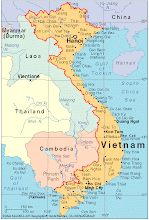The Yen Bai mutiny was an uprising on February 10, 1930 by Vietnamese soldiers in the French colonial army's garrison in Yen Bai in February 1930, sponsored by the Viet Nam Quoc Dan Dang (VNQDD), the Vietnamese Nationalist Party. The attack was the largest disturbance against the colonisation of Vietnam since the Can Vuong monarchist movement of the late 19th century. The aim of the revolt was to inspire a wider uprising among the general populace in an attempt to overthrow the colonial authority. The VNQDD had previously attempted to engage in clandestine activities to undermine French rule, but increasing French scrutiny on their activities led to their leadership group taking the risk of staging a large scale military attack in the Red River Delta in northern Vietnam.
Shortly after midnight on February 10, Vietnamese soldiers within the Yen Bai garrison, some of whom were VNQDD members, turned on their French superiors with assistance from civilian VNQDD members who invaded the camp from the outside. The mutiny failed within 24 hours when the majority of the Vietnamese soldiers in the garrison refused to participate and remained loyal to the colonial army. Further sporadic attacks occurred across the Delta region, with little impact. French retribution to the attack was swift and decisive. The main leaders of the VNQDD were arrested, tried and put to death, effectively ending the military threat of what was previously the leading Vietnamese nationalist revolutionary organisation.
The civilian judicial crackdown was followed by sweeping reforms with respect to the using of Vietnamese soldiers in the French colonial army. French trust in the Vietnamese soldiers' loyalty as colonised subjects who were simultaneously enforcers of colonial order had never been high, and the mutiny resulted in increased safeguards against Vietnamese soldiers in an attempt to prevent future incidents. Around 80% of the Vietnamese soldiers in Tonkin were transferred to other districts in order to disrupt any secret plots that may have been in progress, and some soldiers who had returned from foreign service were discharged in the fear that their overseas experiences made them less likely to accept colonial subjugation. The internal reform saw the rules for expelling Vietnamese soldiers from the army were liberalised and an inquiry into military intelligence resulted in closer cooperation between military intelligence and their French colonial civilian counterparts, while French officers were ordered to improve their Vietnamese language skills. The French authorities decreed that the proportion of ethnic Vietnamese soldiers was too high and reduced the proportion of Vietnamese by replacing them with European, Cambodian, Lao and ethnic minority Montagnard people.
Shortly after midnight on February 10, Vietnamese soldiers within the Yen Bai garrison, some of whom were VNQDD members, turned on their French superiors with assistance from civilian VNQDD members who invaded the camp from the outside. The mutiny failed within 24 hours when the majority of the Vietnamese soldiers in the garrison refused to participate and remained loyal to the colonial army. Further sporadic attacks occurred across the Delta region, with little impact. French retribution to the attack was swift and decisive. The main leaders of the VNQDD were arrested, tried and put to death, effectively ending the military threat of what was previously the leading Vietnamese nationalist revolutionary organisation.
The civilian judicial crackdown was followed by sweeping reforms with respect to the using of Vietnamese soldiers in the French colonial army. French trust in the Vietnamese soldiers' loyalty as colonised subjects who were simultaneously enforcers of colonial order had never been high, and the mutiny resulted in increased safeguards against Vietnamese soldiers in an attempt to prevent future incidents. Around 80% of the Vietnamese soldiers in Tonkin were transferred to other districts in order to disrupt any secret plots that may have been in progress, and some soldiers who had returned from foreign service were discharged in the fear that their overseas experiences made them less likely to accept colonial subjugation. The internal reform saw the rules for expelling Vietnamese soldiers from the army were liberalised and an inquiry into military intelligence resulted in closer cooperation between military intelligence and their French colonial civilian counterparts, while French officers were ordered to improve their Vietnamese language skills. The French authorities decreed that the proportion of ethnic Vietnamese soldiers was too high and reduced the proportion of Vietnamese by replacing them with European, Cambodian, Lao and ethnic minority Montagnard people.

No comments:
Post a Comment